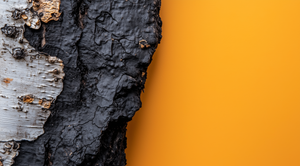A guide to mushroom tea: Types, benefits, and side effects
Mar 12, 2025
Mushroom tea is made by steeping medicinal mushrooms in hot water, offering a potential way to enjoy the benefits of these fungi in a soothing drink. While mushroom tea is widely consumed, it’s important to acknowledge that much of the research on its benefits is still in the early stages. This guide will explore the different types of mushroom tea, their possible benefits, and side effects.
What is mushroom tea?
Mushroom tea is typically made from mushrooms like reishi, lion’s mane, chaga, and turkey tail, which are believed to support various aspects of health. These mushrooms contain bioactive compounds that may promote immune function, brain health, and stress reduction, among other benefits.
While shroom tea – and we don't mean the psychedelic kind – can offer these benefits, the active compounds may be less concentrated compared to supplements. This makes tea a milder option for those looking for a gentle boost without the intensity of concentrated doses.
How to make mushroom tea
Making mushroom tea is simple. Start by using one to two teaspoons of dried mushrooms, depending on the type. Steep them in hot water for 10-15 minutes, and strain the tea. You can add honey, lemon, or other flavorings to improve the taste.
Types of mushroom teas
There are several types of mushroom teas, each with its unique set of potential benefits. Let’s take a look at the most commonly consumed mushroom teas.
Reishi mushroom tea
Reishi tea is made from the reishi mushroom, often called the "mushroom of immortality." This mushroom has a reputation for supporting the immune system and helping manage stress. Reishi mushroom tea can potentially protect against inflammation and may help promote relaxation and improve sleep.
While reishi tea offers these benefits, a reishi supplement like SOOO calm provides higher concentrations of its active compounds, making it a more efficient way to gain the full effects.
Turkey tail mushroom tea
Turkey tail mushroom tea is made from the turkey tail mushroom, which is recognized for its potential immune-boosting effects. The mushroom contains polysaccharides like PSK and PSP, which may help activate immune cells. Drinking turkey tail mushroom tea can potentially support immune health, but the concentration of active compounds is likely lower than in supplements.
Chaga mushroom tea
Chaga mushroom tea is made from the chaga fungus, which grows on birch trees. Known for its high antioxidant content, chaga mushroom tea may help protect cells from oxidative damage and may reduce inflammation.
While the antioxidant content is well-documented, the tea may provide lower concentrations compared to chaga supplements, which are a more effective way to reap its full antioxidant benefits.
Lion's mane mushroom tea
Lion’s mane mushroom tea is made from the lion’s mane mushroom, which is known for supporting cognitive function. Research suggests that lion’s mane might help stimulate nerve growth and improve memory. Drinking this tea regularly may help enhance focus and mental clarity over time.
Benefits of mushroom tea
While research on the specific mushroom tea benefits is still limited, the potential benefits of the mushrooms used to make it are better documented. Here are some of the ways mushroom teas may support your health:
May manage stress and inflammation
Reishi mushroom tea may help manage stress and inflammation. Reishi mushrooms contain compounds that might help balance stress hormones and support the body’s ability to cope with stress. This tea could potentially promote relaxation and calm, contributing to stress management.
RELATED: Chronic inflammation: Understanding the fire that ages us
Packs micronutrients and antioxidants
Chaga mushroom tea is rich in antioxidants, which may help protect the body’s cells from oxidative stress. While antioxidants in chaga tea can offer some protection, the concentration might be lower compared to other forms of chaga.
May boost heart and gut health
Reishi and turkey tail mushroom teas may help support heart and gut health. Reishi mushrooms may help with cholesterol levels and blood sugar regulation, while turkey tail mushrooms may foster a healthy gut microbiome.
RELATED: Microbiome dysbiosis: A hallmark of aging and the gateway to longevity
May improve mood
Reishi and lion’s mane mushrooms may help improve mood by supporting the balance of neurotransmitters in the brain. Reishi may help regulate stress hormones, while lion’s mane may support cognitive function. While these mushrooms show promise in improving mood, the concentration of active compounds in the tea form may be less potent.
May improve sleep
Reishi mushroom tea is commonly consumed for its calming effects, which may help improve sleep quality. Some studies suggest that reishi can promote relaxation and reduce anxiety, contributing to a more restful night.
Naturally low in caffeine
Mushroom tea is naturally low in caffeine, making it a good option for those who wish to avoid the stimulating effects of traditional teas or coffee. Most mushroom teas are caffeine-free, allowing you to enjoy a calming beverage without the risk of disrupting sleep or causing jitteriness.
RELATED: Mushroom coffee: What it is, benefits, and side effects
May boost immune system
Mushroom teas like turkey tail and chaga may support immune health due to their high content of beta-glucans and other bioactive compounds. These compounds may help activate immune cells and potentially enhance the body’s defenses.
Mushroom tea side effects
Mushroom tea is generally considered safe for most people, but it may cause mild side effects in some individuals. The most common side effects are digestive issues, such as bloating or nausea, particularly if the body is not used to consuming mushrooms.
Reishi mushrooms, in particular, might cause allergic reactions in some sensitive individuals. If you're pregnant, nursing, or taking medications, it’s always advisable to consult a healthcare provider before incorporating mushroom tea into your routine.
Mushroom tea vs. mushroom supplements: Which is better?
Mushroom tea offers a calming, caffeine-free option that's gentle on the stomach and helps with hydration. It’s ideal for relaxation, especially before bedtime. However, the active compounds are less concentrated in tea compared to supplements, so you may need to drink more to feel the effects.
The taste can be earthy or bitter, but flavorings like honey or lemon can help. Benefits might take longer to show due to the lower concentration. Additionally, mushroom tea is typically more affordable than supplements.
Mushroom supplements, on the other hand, provide higher concentrations of active compounds, offering more potent effects in smaller doses. They are convenient, consistent, and often targeted for specific health concerns. However, they lack the soothing, hydrating qualities of tea and can cause digestive discomfort in some. Supplements tend to be more expensive than tea.
The choice between tea and supplements depends on your preferences, health goals, and budget — tea for a mild, calming experience and supplements for stronger, more targeted benefits.
Bottom line: Is mushroom tea good for you?
Mushroom tea might offer several health benefits, including immune support, stress management, and cognitive enhancement. However, the concentration of active compounds in mushroom tea is typically lower than in supplements, which are a more efficient way to experience the full effects of medicinal mushrooms. If you're looking for concentrated benefits, consider using supplements alongside or instead of mushroom tea.
🛒 SHOP PHARMA-GRADE LONGEVITY NUTRACEUTICALS AT SOOO.ME™ 🛒
FAQ
What does mushroom tea do to your body?
Mushroom tea can support immune function, reduce stress, and provide antioxidants. It may help promote relaxation and overall wellness, although the effects can vary depending on the type of mushroom used.
Is mushroom tea good for inflammation?
Mushroom teas like reishi and chaga may help manage inflammation. The compounds in these mushrooms might support the body’s natural inflammatory response, potentially contributing to overall health.
What mushroom tea is good for anxiety?
Reishi mushroom tea may help reduce anxiety due to its calming, adaptogenic properties. It can promote relaxation and may support the body's ability to cope with stress. However, the effects may be less noticeable in tea form compared to supplements.
What does lion's mane mushroom tea do?
Lion’s mane mushroom tea is believed to support cognitive function and memory. It may help improve mental clarity and focus, contributing to brain health and cognitive well-being.
READ NEXT: What are longevity supplements and do you need them?


